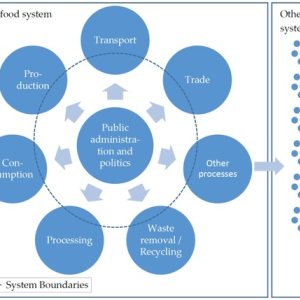
This research article presents a novel method for assessing public policy with regard to an urban food system and discusses a first application of the approach in Basel, Switzerland. We want to thank FCRN member Christian Schader from the Research Institute of Organic Agriculture (FiBL) for providing us with this summary of his and his colleagues research.
With over half the world’s population living in urban areas, cities’ food systems represent an important part of the global food system and have a substantial impact on natural habitats and on farmers’ livelihoods around the world. So far, the focus of quantitative urban food system sustainability assessments has been on measuring the impacts of urban food system public policy (e.g. on health). These data-intensive approaches are suitable for cities that have already started implementing a holistic food system governance. This research article has a different focus: the method presented assesses the existing food system public policy itself by benchmarking it against best practice from the literature for a wide range of sustainability topics.
As a framework for sustainability, we selected guidelines for Sustainability Assessment of Food and Agriculture Systems (SAFA) by the Food and Agriculture Organization (FAO) and developed a method with 97 indicators for operationalizing 52 sustainability themes. Using Multi-Criteria Analysis, the degree of goal achievement for each subtheme was calculated and the indicators were discussed in a participatory process with stakeholders from Basel’s food system to determine their perceived relevance.
Key findings are:
- The SAFA guidelines generally proved suitable for assessing urban food systems, but not all of the SAFA-sustainability topics were applicable to the urban food system context.
- The first application of the assessment in Basel yielded a broad picture of the urban food system’s public policy and identified weaknesses such as the lack of coordination of policy and transparency, as well as weak procurement criteria.
- It is noted that possible changes in policy need to be monitored with existing assessment approaches to analyse their effectiveness.
Abstract
A growing number of people live in cities. Urban food systems and their impacts on ecosystems and socio-economic conditions are becoming increasingly important. To address the challenge of making urban food systems more sustainable, a rising number of assessments of urban food systems have been published. Some used large quantitative datasets while others were descriptive in nature and/or do not address the whole thematic spectrum of sustainability. In this study, an indicator set was developed, which uses widely available data to address all dimensions of sustainability. The indicators focus on policies and measures of public administration and local politics and are based on the guidelines for Sustainability Assessment of Food and Agriculture Systems (SAFA) by the Food and Agriculture Organization (FAO). To operationalize the SAFA-Guidelines, we developed, in a participatory process, a multi-criteria assessment method with 97 indicators for evaluating 51 of the 58 SAFA subthemes, which were deemed relevant for the context of an urban food system. The first application of this method in the city of Basel, Switzerland, revealed concrete areas of improvement relating to the sustainability of the food system. In combination with cost-effectiveness analysis, stakeholder consultation, and monitoring measures, the results of the assessment method can be used to initiate the process of moving towards more sustainable urban food systems.
Reference
Landert, J., Schader, C., Moschitz, H., Stolze, M., (2017) A Holistic Sustainability Assessment Method for Urban Food System Governance, Sustainability 2017, 9(4), 490; doi:10.3390/su9040490
Read the full paper here (open access).







Post a new comment »